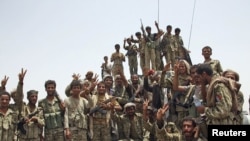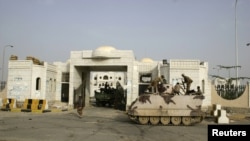Yemeni officials say government troops have recaptured two al-Qaida strongholds in the country's south after a month-long offensive against the militant group, which seized the areas more than a year ago.
Officials said Tuesday that Yemeni troops and their tribal allies took full control of Abyan's provincial capital, Zinjibar, and the town of Jaar to the north. They said government forces also re-opened a major highway linking Abyan with the southern port of Aden.
Yemeni officials said troops drove into Jaar early Tuesday after a battle that killed 20 militants and four soldiers. Residents celebrated the soldiers' arrival by firing weapons into the air. Hours later, officials said the troops completed the takeover of Zinjibar.
Al-Qaida militants seized parts of Abyan last year while the government was pre-occupied with fighting a pro-democracy uprising against then-President Ali Abdullah Saleh. His successor Abed Rabbo Mansour Hadi launched a U.S.-backed military offensive last month to recapture those areas.
Government victory
Brookings Doha Center conflict resolution expert Ibrahim Sharqieh told VOA the fall of the al-Qaida strongholds represents a major victory for Mr. Hadi, who took office in February.
Speaking by phone from Qatar, he said he expects Yemeni troops to advance on another city, Shuqra, in the coming days.
"If the army is able to take this city back, then we should be talking about al-Qaida disappearing from major cities in Abyan," he said.
Sharqieh said one factor contributing to al-Qaida's downfall in the region is that local communities turned against the group.
"They have showed whether it is in the first city of Lawdar or now in Jaar or Zinjibar that the local militia, local communities collaborated highly with the Yemeni army and they fought alongside to expel al-Qaida fighters from their cities," he said. "This has been truly a key factor for their success."
The Brookings expert said President Hadi's ability to take control of army divisions from allies of his predecessor also helped the Yemeni military's fight against al-Qaida.
Mr. Saleh's critics had long accused him of holding back the military from defeating al-Qaida in order to fuel instability in the country and justify a continuation of his three-decade long autocratic rule.
UN warning
The military moves come as the U.N. Security Council sent a strong message Tuesday to all stakeholders in Yemen’s political process, saying if they undermine the country’s political transition to democracy they could face international sanctions.
The 15-nation Security Council voted unanimously for a resolution calling on all Yemeni actors to reject violence, hold an inclusive national dialogue and stop undermining the political transition put in motion.
If that fails, the council will consider sanctions against those obstructing the process.
British Ambassador Mark Lyall Grant, who was one of the sponsors of the text, said potential spoilers should read the resolution carefully.
“Because it makes clear that any spoilers, those who are trying to disrupt the transition, disrupt the national dialogue, disrupt the national unity government, will be held accountable," he said. "And the council expresses itself ready to adopt measures under Article 41, which as you know, includes various sanctions measures for all those who are trying to spoil the process.”
Yemen’s Ambassador Jamal Al Salal welcomed the resolution. He said Yemen has made significant progress, but difficulties and challenges persist. He said the country is facing a deteriorating humanitarian situation and shortages of basic services and security threats.
Lipin reported from Washington and Besheer from the United Nations.
Officials said Tuesday that Yemeni troops and their tribal allies took full control of Abyan's provincial capital, Zinjibar, and the town of Jaar to the north. They said government forces also re-opened a major highway linking Abyan with the southern port of Aden.
Yemeni officials said troops drove into Jaar early Tuesday after a battle that killed 20 militants and four soldiers. Residents celebrated the soldiers' arrival by firing weapons into the air. Hours later, officials said the troops completed the takeover of Zinjibar.
Al-Qaida militants seized parts of Abyan last year while the government was pre-occupied with fighting a pro-democracy uprising against then-President Ali Abdullah Saleh. His successor Abed Rabbo Mansour Hadi launched a U.S.-backed military offensive last month to recapture those areas.
Government victory
Brookings Doha Center conflict resolution expert Ibrahim Sharqieh told VOA the fall of the al-Qaida strongholds represents a major victory for Mr. Hadi, who took office in February.
Speaking by phone from Qatar, he said he expects Yemeni troops to advance on another city, Shuqra, in the coming days.
"If the army is able to take this city back, then we should be talking about al-Qaida disappearing from major cities in Abyan," he said.
Sharqieh said one factor contributing to al-Qaida's downfall in the region is that local communities turned against the group.
"They have showed whether it is in the first city of Lawdar or now in Jaar or Zinjibar that the local militia, local communities collaborated highly with the Yemeni army and they fought alongside to expel al-Qaida fighters from their cities," he said. "This has been truly a key factor for their success."
The Brookings expert said President Hadi's ability to take control of army divisions from allies of his predecessor also helped the Yemeni military's fight against al-Qaida.
Mr. Saleh's critics had long accused him of holding back the military from defeating al-Qaida in order to fuel instability in the country and justify a continuation of his three-decade long autocratic rule.
UN warning
The military moves come as the U.N. Security Council sent a strong message Tuesday to all stakeholders in Yemen’s political process, saying if they undermine the country’s political transition to democracy they could face international sanctions.
The 15-nation Security Council voted unanimously for a resolution calling on all Yemeni actors to reject violence, hold an inclusive national dialogue and stop undermining the political transition put in motion.
If that fails, the council will consider sanctions against those obstructing the process.
British Ambassador Mark Lyall Grant, who was one of the sponsors of the text, said potential spoilers should read the resolution carefully.
“Because it makes clear that any spoilers, those who are trying to disrupt the transition, disrupt the national dialogue, disrupt the national unity government, will be held accountable," he said. "And the council expresses itself ready to adopt measures under Article 41, which as you know, includes various sanctions measures for all those who are trying to spoil the process.”
Yemen’s Ambassador Jamal Al Salal welcomed the resolution. He said Yemen has made significant progress, but difficulties and challenges persist. He said the country is facing a deteriorating humanitarian situation and shortages of basic services and security threats.
Lipin reported from Washington and Besheer from the United Nations.






